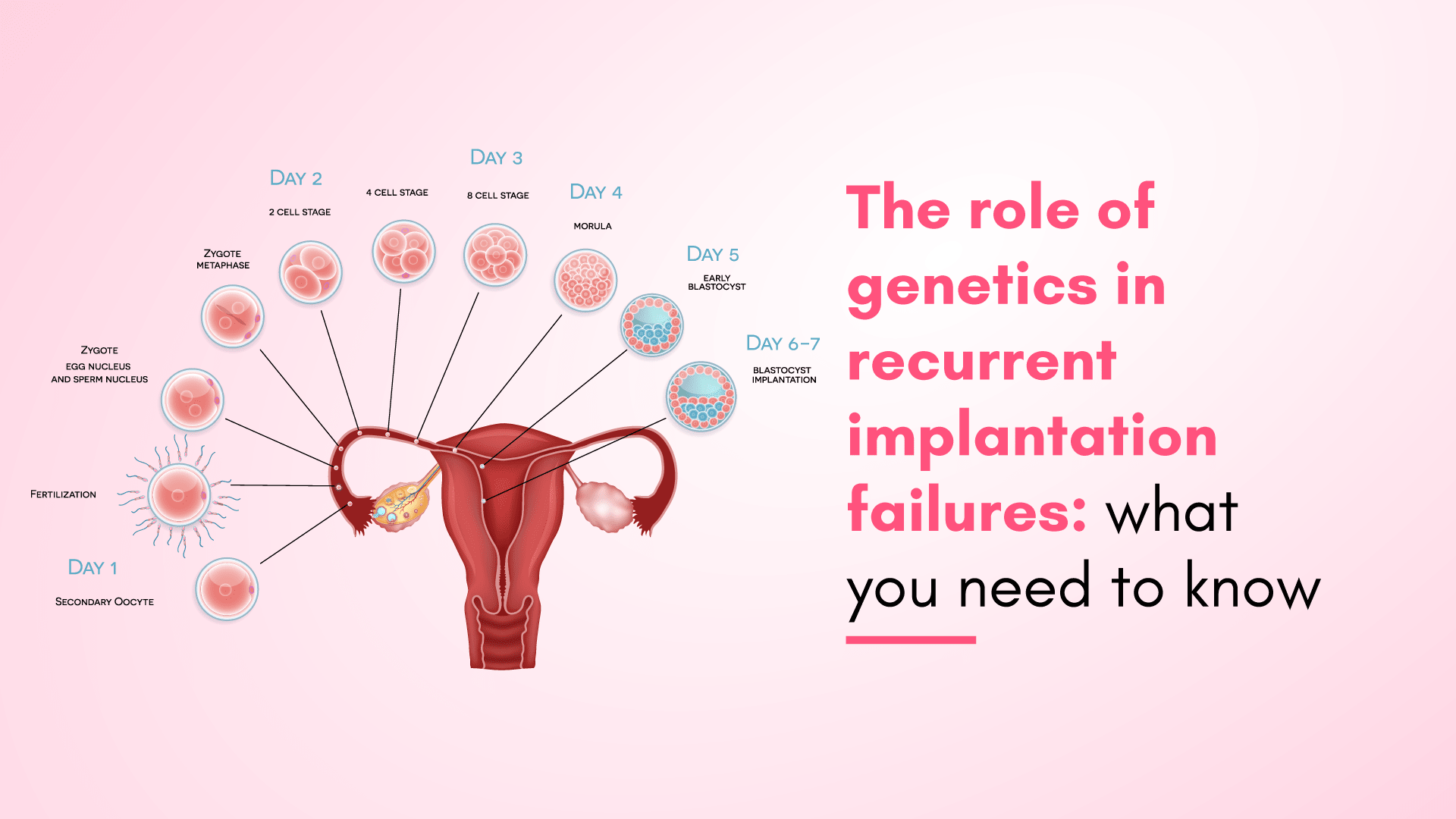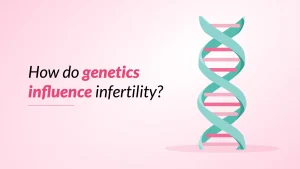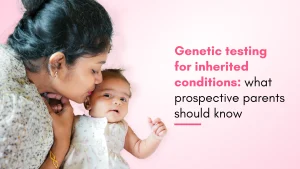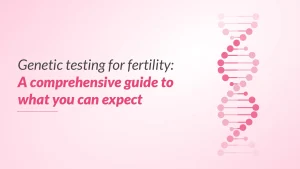Recurrent implantation failure (RIF) refers to the repeated inability of a fertilized egg to implant successfully into the uterus walls. Genetics plays a significant role in RIF, inadequate uterine receptivity contributes to about two-thirds of implantation failures, while embryo-related factors account for the remaining one-third.
This blog explores the connection between genetics and RIF, discussing the genetic abnormalities associated with RIF, their effects on embryo quality, and the current assessment and management techniques available.
What is Recurrent Implantation Failure (RIF)?
Recurrent implantation failure (RIF) is a clinical term that refers to the failure of an embryo to successfully attach to the uterine lining and achieve clinical pregnancy following several transfer attempts.
Below are the key terms associated with RIF:
- Recurrent: Defined as two or more failed implantation attempts.
- Implantation: The stage where a fertilized egg (zygote) attaches to the inner wall of the uterus, initiating a pregnancy.
- Failure: The inability to implant or the early loss of an implanted embryo.
While various factors can cause implantation failure, including hormonal and uterine abnormalities, genetic factors contribute to many RIF cases.
How can genetic abnormalities lead to recurrent implantation failures?
Genetic anomalies in the sperm or egg can affect implantation by rendering the embryo nonviable or unable to sustain a pregnancy. These abnormalities can lead to early termination of pregnancy following embryo transfer.
Genetic Factors Associated with RIF
There are three main categories of genetic factors that can contribute to recurrent implantation failure:
1. Chromosomal Abnormalities:
Aneuploidy: This refers to the presence of an abnormal number of chromosomes, which negatively impacts embryo implantation.
2. Single Gene Mutations:
Certain genes also affect the success of the implantation process. Abnormal changes in any of these genes can lead to the cessation of important functions essential to a healthy pregnancy.
3. Polymorphisms and Genetic Variations:
A small gene variation might not be directly associated with RIF but can affect the chance of implantation. Research is ongoing into the roles of these variations in RIF treatments.
Impact of Genetic Factors on Embryo Quality and Implantation Potential
Genetic abnormalities can affect embryo quality in several ways:
- Abnormal cell division: Chromosomal defects during mitosis can result in an uneven number of embryo cells.
- Disrupted gene function: Gene mutations can hinder essential processes such as cell development, differentiation, and implantation.
- Poor placental development: Some gene variants can impair placental health, affecting embryo viability.
These issues reduce the embryo’s potential for implantation and survival.
Also Read: IVF cost – Myths and facts, inclusions, Ferty9’s promise of affordability
Diagnostic Approaches for Genetic Evaluation in RIF
If the implantation fails after several attempts, specific genetic tests may be recommended to determine the cause. Here are some key diagnostic tools:
Preimplantation Genetic Testing (PGT)
This method can determine an embryo’s genetic characteristics before its chance to implant in an IVF cycle. PGT has three main categories:
- PGT-A (Aneuploidy Screening):This method identifies embryos and analyzes their chromosomes to ensure they have 46 chromosomes, the correct number for a healthy pregnancy.
- PGT-M (Monogenic Disorders):It is a specialized procedure used during in vitro fertilization (IVF) to screen embryos for specific genetic disorders caused by single-gene mutations. This test aims to identify and select embryos free from those genetic conditions, thus increasing the chance of a healthy pregnancy.
- PGT-SR (Structural Rearrangements):This method analyzes chromosome anomalies, including translocation and inversion between chromosome segments that may affect implantation. These abnormalities, such as translocation, inversions, or deletions, can lead to implantation failure. PGT-SR thus helps identify embryos with the correct chromosomal structure leading to a higher possibility for pregnancy.
Also Read: Genetic Testing Costs in Fertility Treatment: PGS/PGT
Genetic Screening Techniques in Preconception and Prenatal Settings
Genetic screening plays a crucial role in both preconception planning and prenatal care for couples experiencing recurrent implantation failure (RIF). Identifying genetic factors early on can guide treatment decisions and improve the chances of successful implantation and pregnancy. This proactive approach not only offers hope to couples facing challenges but also paves the way for healthier pregnancies and outcomes.
- Carrier Screening:Screens for genetic variants in carriers who might pass them on, potentially causing implantation failure.
- Genetic Counseling:The genetic counselor will assist the client in interpreting and addressing possible genetic risks or treatment.
Also Read: The Role Of Fertility Centers In Modern Reproductive Medicine
Management and Treatment Approach
Recurrent implantation failure in the presence of a genetic component is usually treated with the integration of several strategies. Depending on the specific genetic factors identified, treatment for implantation problems includes the following options:
- PGT with IVF: PGT allows the selection of embryos with desirable chromosomes or those without mutations that can affect conception and the baby’s health.
- Addressing underlying medical conditions: Medicinal conditions such as hormonal irregularities or uterine infection can be carefully managed to facilitate implantation.
Conclusion
Recurrent implantation failure cases are rather frustrating, but there are several options available to treat this issue, including a genetic test and understanding the contributing factors. Noninvasive PGS and other developments in molecular genetics offer couples diagnosed with RIF hope for conception and realization of parenthood. For personalized care and the best fertility treatment options related to recurrent implantation failures, consider visiting Ferty9 Fertility Center, where hope turns into happiness with expert guidance and support.




























